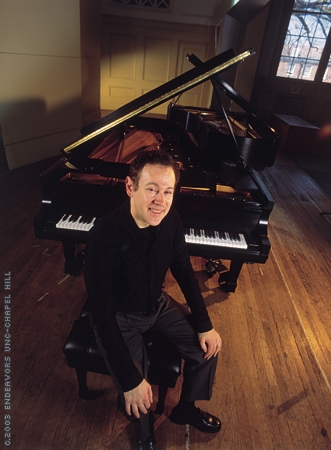
As a solo pianist, I’ve dealt with the study and performance of etudes – pieces that address specific technical and/or musical challenges – over most of my career. I was excited to discover the recent Piano Etudes (1997 – 2007) of African-American composer H. Leslie Adams at the suggestion of my UNC Chapel Hill colleague Louise Toppin. She was creating a festival at UNC in March of 2012, celebrating the 25th anniversary of Videmus, an organization dedicated to promoting the works of under-represented groups such as African-American and women composers.
While I was preparing to perform the etudes for this festival, Louise put me in touch with the composer. Upon hearing samples of my playing, Leslie Adams asked me whether I’d be interested in recording his complete Piano Etudes, Parts I and II. I gave this offer careful thought, but decided that it was too big a project – a total of 26 pieces – to complete successfully. However, I became interested in recording Part II by itself, as these fourteen etudes (written between 2000 and 2007) had yet to be recorded.*
As one unfamiliar with Leslie’s music, I found myself in for a real treat! His style, though classically rooted, incorporates strong elements of jazz and pop music, giving it a crossover vibe that’s most engaging and very current/“hip” in feel. It’s highly melodic and gorgeously crafted in terms of sonority and texture, invoking a sound world where Rachmaninoff meets Burt Bacharach, so to speak. These engaging pieces are enjoyable and rewarding to play, and people respond strongly to their inherent warmth and depth of emotion.
I have a long-standing interest in the jazz idiom, dating back to my days as aTouring Artist of the California Arts Council in the 1990s. These etudes allow me to reconnect with this style that both fascinates and mystifies me, given my standard classical, “white-boy” training and roots. Leslie’s unique, eclectic mix of classical/jazz/pop idioms really suits my temperament, as well as my love for creating beautiful sonorities, textures, and lines at the keyboard.
I’m delighted and honored to bring this wonderful music further into the public eye, and excited by the prospect of helping these etudes find their proper place in the piano repertoire. We need music of our time with which people can connect on a personal, meaningful level – and Leslie’s music fits the bill in a big way. I hope you enjoy listening to it as much as I enjoy playing it!
– Thomas Otten
*Part I was recorded by Maria Corley in 2003.
I love to teach and thus am excited also to offer a masterclass where I will work in public with local pianists! It’s a privilege to offer my opinions and suggestions to to others who have dedicated themselves in some way to mastering the complexities of piano playing – keeping in mind, of course, that that there are many solutions to musical and technical problems in the “land of the 88.” Questions and comments from the audience are most welcome!